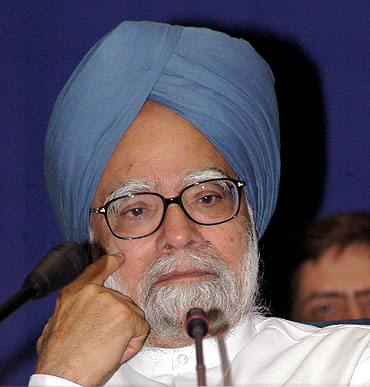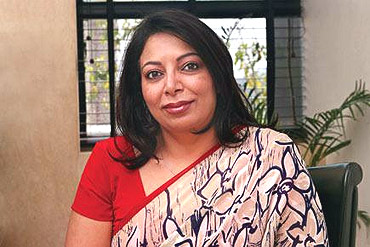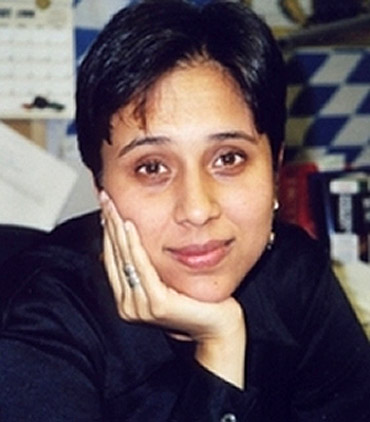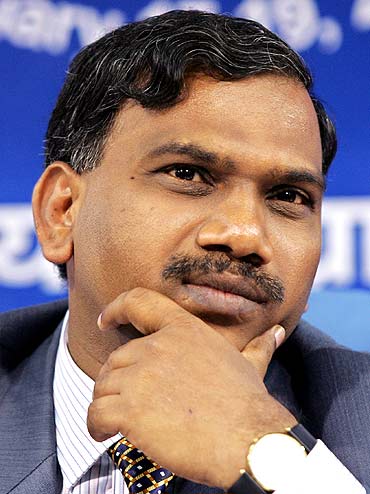Photographs: Ranjan Basu/Saab Pictures Sheela Bhatt
On January 1, 2010, I didn't imagine Prime Minister Manmohan Singh would be fighting a political battle to save his famed credibility. I didn't imagine he would have to prove that as the chief guardian of the people's interest he did everything possible to stop A Raja, then telecommunications minister, from adopting wily methods -- while allotting 2G spectrum to favour companies -- that would result in monumental financial loss to the exchequer.
In the last 12 months, Dr Singh has lost something intangible -- an aura that defies description. He was the face of India's liberalisation and economic reforms. He was, it was claimed and is still being claimed, an honest man and an honest prime minister of a corrupt country.
But, his statement as the year drew to a close, claiming that Caesar's wife should be above suspicion, is shocking. It sounds like he is telling the people: 'I am not stealing money from your pocket. Like Caesar's wife, I should be above suspicion.'
Things coming to such a pass suggest a tragedy in Dr Singh's political career this year. The 2G spectrum controversy betrays the thinking Indians' faith in liberalisation.
We wanted the license raj to go. So came liberalisation, where government babus lost some of their clout. With it came the 'open' policy where spectrum was sold for a price to private players by the government -- because airwaves that allow mobile telephony are public property.
Why this corruption, then, Mr Prime Minister? Why did you allow under-invoicing? Why didn't you stop it before it happened? Where is my money? Is this corruption or blatant loot?
The issue is so simple that there is hardly anything to investigate.
Please ..
The Radia tapes are a guidebook of what happens behind closed doors in India today
Image: The Niira Radia tapes must be a part of the political syllabusBecause it's the short cut -- the laziest way -- to get inside information, which is difficult to get these days. You see, we don't get time to read, study and analyse the issues these days. The politicians in India know that the illiterate media needs many Radias.
The Radia tapes, released by Open and Outlook magazines, should be part of the syllabus for political scientists and students of mass communication. They are a guidebook of what happens behind closed doors in the pursuit of power and money in India today.
In Barkha Dutt's embarrassment is hidden our shame
Image: This controversy has made me look at the need to re-draw the lines much more carefully, Barkha Dutt has saidWhen the year began, nobody ever thought Dutt would be grilled in a television studio, and that she would have to confess that the way she dealt with Radia was an error of judgment.
She was forced to declare -- on the same prime time television slot that she had ruled -- that 'in 16 years of my career, no one has cast a doubt on my reputation.'
Uncanny, the similarity of her defence to that of Prime Minister Singh's -- 'But, you know me! I am not corrupt!'
In her evident embarrassment is hidden our own shame.
Many of today's senior journalists and editors came up in the post-Emergency years and enjoyed the fruits of post-1992 economic reforms.
Now, we have Blackberries, iPads and swanky cars. Some like Dutt and other iconic editors drive SUVs too. All this was unthinkable before Dutt's generation, a generation that boasts of a drive for success and the guts to scorch the fast lane of breaking -- and making -- news.
Dutt was a leader in the pack of the urban clan -- including media activists, the NGO brigade and television-supported celebrities -- that is very much part of the new India that has emerged out of Manmohan Singh's envisaged economy.
It is also ironic that Dutt, Singh and this government have been tainted by the mobile telephone -- perhaps the best metaphor for a new India. When the social history of mobile phones is written, the Radia tapes of 2010 should be mentioned.
After the Radia tapes, there are allegations against Dutt that she was playing middle-woman between Radia's client Kanimozhi, the Dravida Munnetra Kazhagham leader from Tamil Nadu, and top Congress leaders to get Raja the telecom portfolio.
Dutt has repeatedly and aggressively denied that and has explained why she was talking to someone like Radia so cozily.
Her defence: 'Unless we believe in only press-conference driven journalism, the need to tap into what's happening behind-the-scenes in the corridors of power involves dealing with a multitude of voices, and yes, we cannot always vouchsafe for the integrity of all those we use as news sources. We concern ourselves primarily with the accuracy of the information This controversy has made me look at the need to re-draw the lines much more carefully.'
'We deserve better editors and reporters'
Image: Former Telecom Minister A Raja: At the centre of the massive 2G spectrum scamPhotographs: B Mathur/Reuters
Why do we need Radia in the first place to elicit information, as Dutt claims? Why don't we treat the Radias and her ilk around Parliament with the contempt they deserve?
Why doesn't our blood boil at such exploiters of the system who render our economy vulnerable, who loot the money that should go to tackle India's terrible poverty?
Dutt thinks there was nothing wrong in her attempt to get information about the process of Cabinet formation from Radia. Which implies that the road to get 'exclusives' and 'breaking news' is through the gutter of 'fixers' in the system. We will get information, but we will have to wade through the slime.
Dutt and Radia's relationship -- exposed to the public through the tapes that were legally recorded by the government and illegally leaked to the media -- reminds us about all that we are doing wrong while reporting Parliament so shabbily.
This country deserves better editors and reporters. If you don't have severe allergy to the Radias of this world, you should not be a journalist. Let us learn that, again.
Historian Ramchandra Guha put it bluntly to me: Editors in New Delhi are so close to power that they seem to be losing their sense of proportion. I want to remember 2010 for my own career's sake.
I want to thank the person who leaked the Radia tapes. It is the loudest wake up call for Indian journalists, who lust for exclusives and breaking news without bothering to read -- even one insightful article a day, or a good book a year -- on current affairs.





article